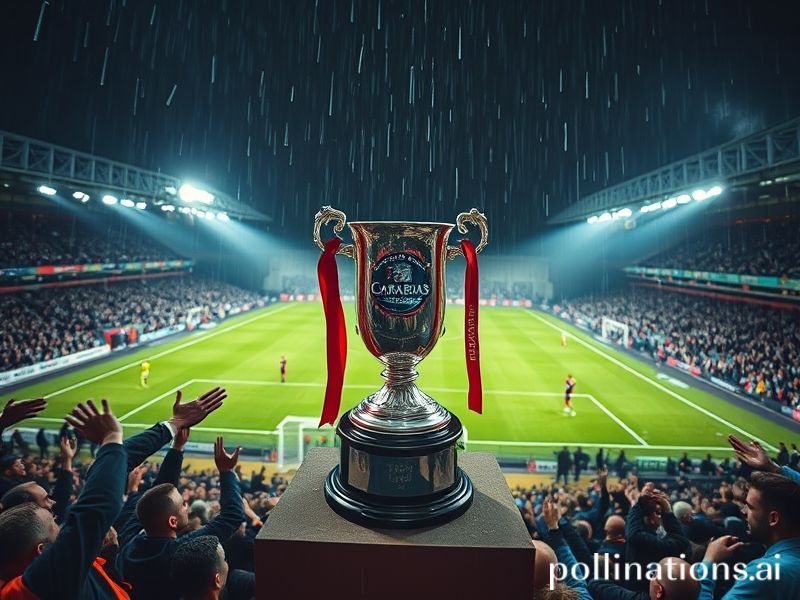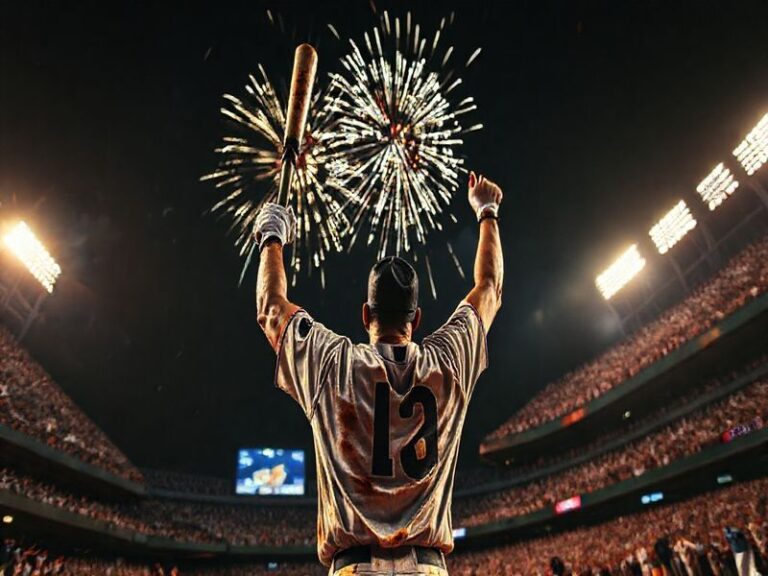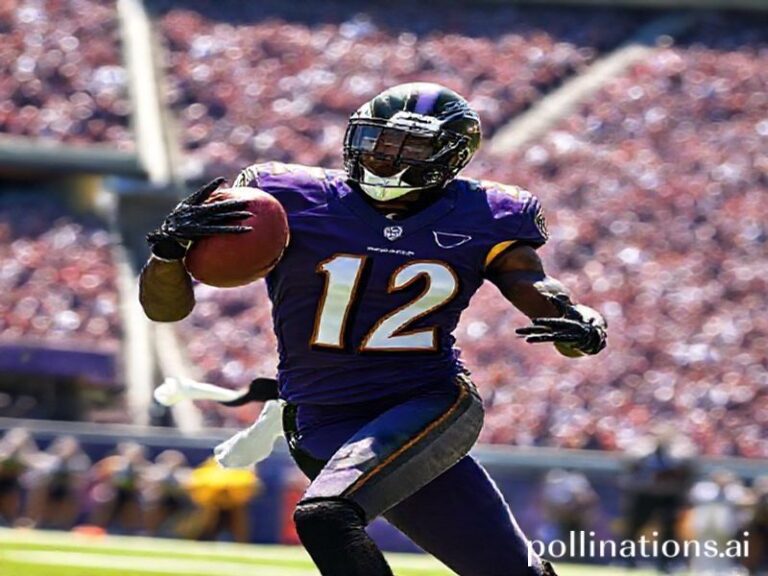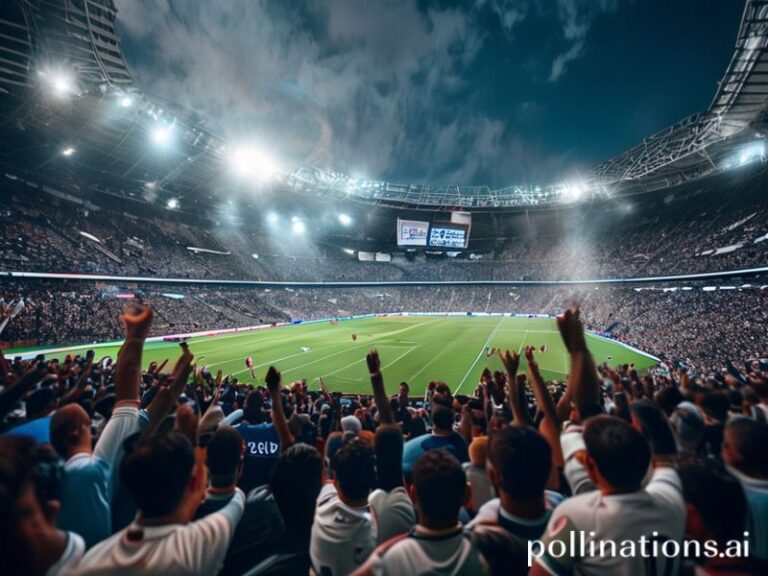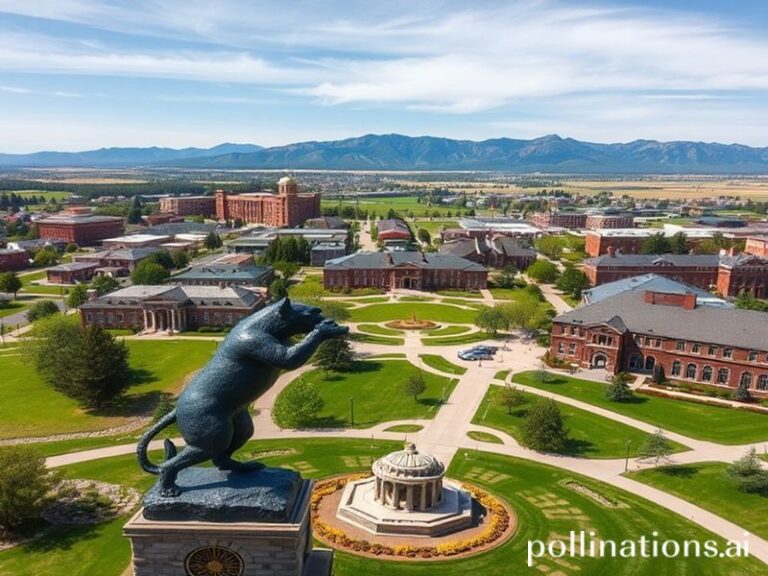The Carabao Cup: How a Tiny English Trophy Became a Global Parable of Modern Absurdity
The Carabao Cup: A Trophy So Small It Might Be a Global Metaphor
By Our Correspondent Still Recovering from a Heathrow Pret-a-Manger
Somewhere in a London suburb on a damp Wednesday night, under lights bright enough to illuminate desperation but not quite hope, the Carabao Cup is being contested. On the surface it is merely England’s secondary knockout tournament, named after a Thai energy drink that tastes like carbonated regret. Yet if you squint through the jet-lag, geopolitics, and general malaise of modernity, the whole affair starts to look like a perfectly distilled allegory for our fractured little planet.
Consider the ingredients:
• A prize whose gleam is inversely proportional to the continent-wide shrug it induces.
• Squads rotated so aggressively that half the players look as if they’ve been teleported in from a FIFA Career Mode glitch.
• Sponsorship money sluicing in from Southeast Asia, where Carabao’s parent company presumably knows that brand recognition in Croydon is the first step toward soft-power hegemony.
• Ticket prices calibrated to remind the working class that, like universal healthcare, affordable football is a nostalgic fairy tale.
The global implications? Oh, they’re there, lurking like VAR officials behind the curtain. In Singapore, insomniac traders streaming the third-round tie on illicit feeds use possession stats as proxy indicators for macroeconomic sentiment—if Everton string three passes together, the baht wobbles. In Lagos, street vendors flog counterfeit Carabao-branded bootleg sachets that promise to make consumers “run like Mount, think like Havertz,” with side-effects that include existential dread and mild tachycardia. Meanwhile, a cryptocurrency startup in Tallinn has issued a Non-Fungible Trophy: for 0.3 Ethereum you can own an animated GIF of the cup spinning forever, which is somehow less pointless than the real thing.
Back in Europe, the competition has become a diplomatic backchannel. When Arsenal drew Brighton, the French ambassador texted the Spanish ambassador: “Arteta’s still rotating Jesus—tell Madrid the submarine cables are safe for now.” Everyone understood; football is the only language the superpowers still share without simultaneously sanctioning each other.
And then there is the carbon footprint. Each edition requires roughly 847,000 air miles of group-stage shuttling, enough to make Greta Thunberg consider a second gap year. But fear not: the League has pledged to offset emissions by planting three (3) trees somewhere in the former Yugoslavia and filming them in moody slow-motion. Broadcast rights have been bundled with a “Green Matchday” marketing package that also features limited-edition bamboo shin pads, retailing for £119.99—because nothing says environmental stewardship like conspicuous consumption wrapped in earth tones.
Human nature, ever reliable, does the rest. Fans who spent the previous weekend tweeting #BoycottQatar2022 over labor abuses are suddenly Googling “cheapest Ryanair to Middlesbrough” because their club might actually win a shiny object smaller than a breadbox. In the stands, grown men weep when a 19-year-old left-back scores in the 119th minute, then upload the footage to TikTok captioned “LITERAL TEARS 😭😭,” where it is immediately monetized by an algorithm that also recommends payday loans and tactical nuclear umbrellas.
Eventually, the final whistle blows. The winning captain hoists the cup skyward like a man lifting a Fabergé egg made of tinfoil. Fireworks—manufactured in a province the Foreign Office has advised against visiting—paint the sky in colors not found in nature. A pundit declares this “a historic night,” ignoring the fact that history generally requires someone to remember it longer than the Uber queue.
So what does the Carabao Cup tell us about the world? Simply that we have engineered a global circus where the stakes are simultaneously microscopic and cosmic. We export branded sugar water, import fleeting glory, and call it trade. We celebrate a trinket whose very existence depends on a supply chain that would make an oil baron blush. And yet, for ninety-odd minutes plus whatever VAR decides to add, humanity agrees to pretend it all matters. That may be the most honest thing we’ve done in years.

